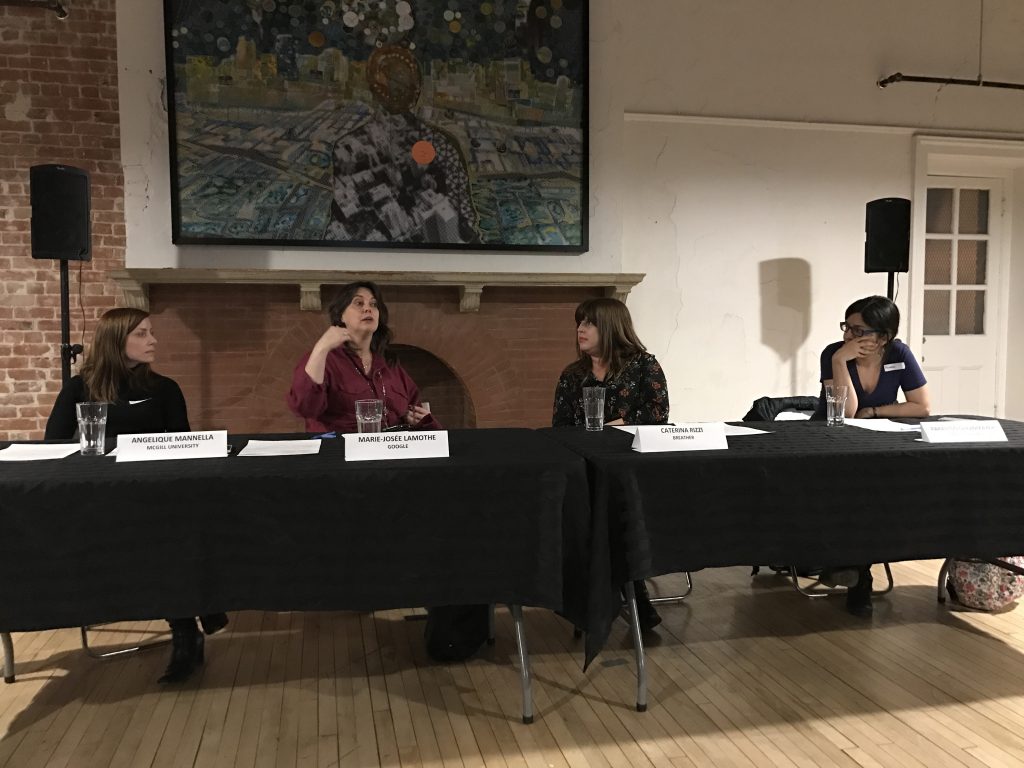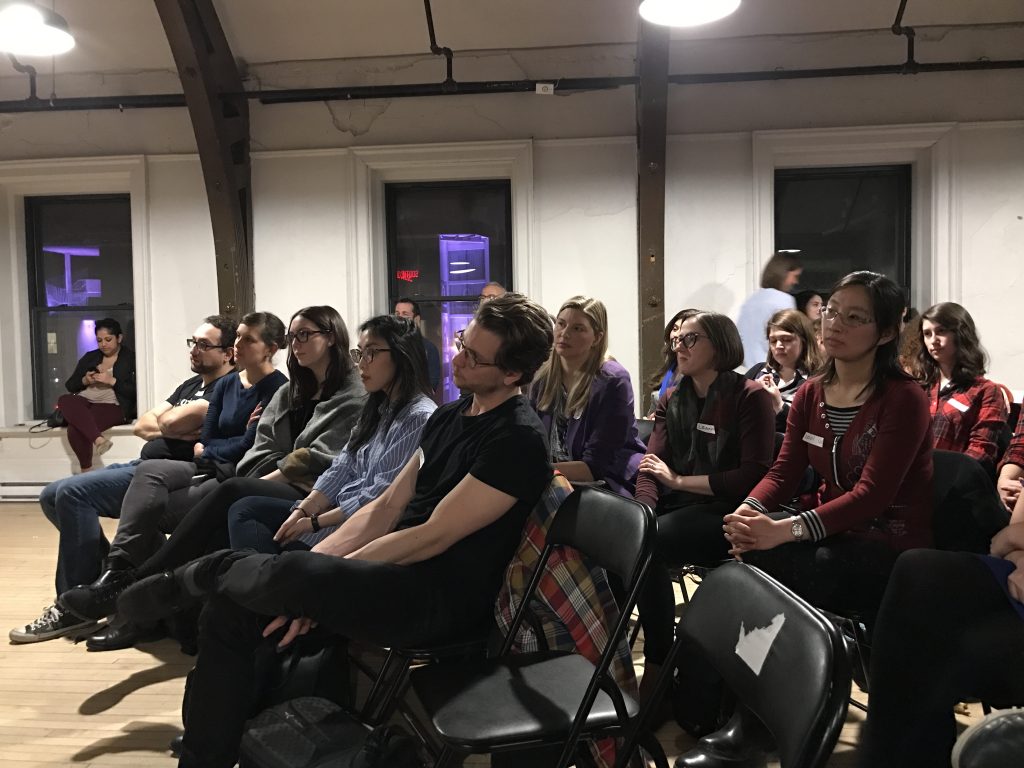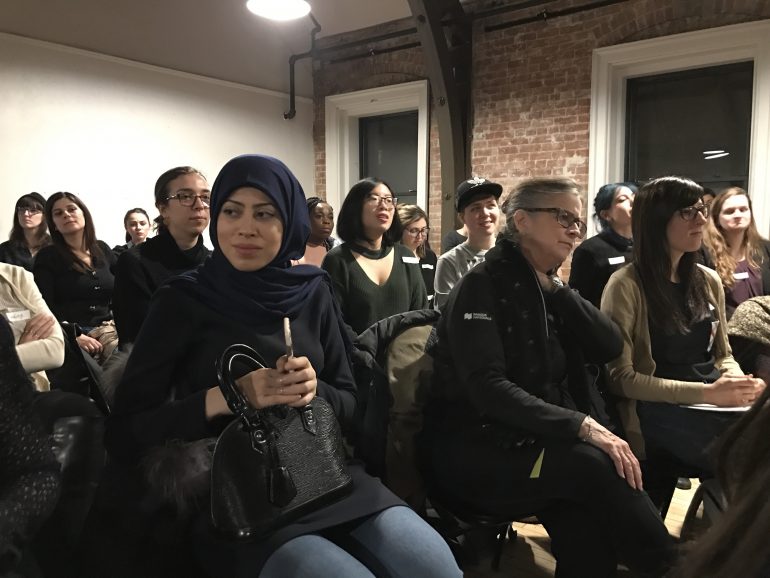Notman House has a mission to get more people into technology and make entrepreneurship and innovation more approachable. A project of the Osmo Foundation — a non-profit that was created in 2009 to support the development of startup ecosystems across Canada — this physical hub including Montreal’s tech startups has had a major influence on the proliferation of technology in the city.
“This year we want to give it another boost,” said Osmo Foundation president and co-founder of Real Ventures and FounderFuel, Alan MacIntosh, at the beginning of Monday night’s Roundtable on Women in Technology.
“Diversity is our big initiative. It’s something that intuitively matters and is the right thing to do, but we also believe that it’s economically important — it’s enriching, stimulating for everybody involved.”
“Most people don’t enjoy being in the minority, and they try to go somewhere that they fit in.” – Parastoo Geranmayeh, developer for Chrome at Google
With double the number of attendees they had initially planned to host for the event, it’s clear that women’s role in technology is something that people want to talk about. The structure was that of a large group discussion — with moderators including Angelique Mannella, associate vice-principal of innovation at McGill University; Caterina Rizzi, Breather co-founder and CCO; Marie-Josee Lamothe, Quebec managing director for Google Canada; and Parastoo Geranmayeh, software developer for Chrome at Google Montreal.
The topics of discussion were brought up by audience members and ranged from ways to make startup culture more inclusive and welcoming for women and minorities, to the problem of recruitment in a market where women often undersell their abilities, while men overestimate theirs.
“I can say with good certainty that the job market is swayed toward men,” said TasteBay founder and president, Lama Hamad. “Overall, men tend to overestimate their abilities — they apply for jobs that are totally out of their realm of experience. And women tend to undersell themselves in the interviews. Every single guy I interview asks for more money. Every woman I interview would have accepted less.”
Women also tend to drop out of tech jobs at an alarmingly high rate, something that can be attributed to a number of factors, including the discomfort of being a clear minority. As one of only two female programmers at Google Montreal’s offices, Geranmayeh acknowledged how difficult it can be for a woman in this environment.
“Most people don’t enjoy being in the minority, and they try to go somewhere that they fit in. That is something that answers the question of why women leave. Women would be more comfortable and leave less if they were one of many.”

On the question of the existence of a glass ceiling, Lamothe felt that it’s all a matter of perspective.
“If you walk into it thinking there’s a glass ceiling, there is one,” she said. “Or you can walk in and say there’s no glass ceiling, and then if there is one you have to confront it head on. Because if you don’t it will always be the elephant in the room. You can confront it head-on or you move on. But ignoring it is accepting the situation. A lot of it is on us; we define our own lives.”
Manella believes that the way to change the culture of tech companies is for more women to take the plunge and build their own.
“Where I believe that change has to come from is grassroots: women creating companies and the environments that work for them. What I see as being very powerful is women believing they have value to add, that they have the confidence to launch a company and they create the culture and the environment that they want.”

With Lamothe saying that women in Quebec being some of the least entrepreneurial in Canada, this could mean getting in early and educating girls about their options. Many audience members spoke about their experiences teaching girls to code, and how girls often find it frustrating to be surrounded by boys and don’t think of technology as something for them.
After more than an hour of engaging discussion, the evening wrapped up with recommendations for concrete action that can take place, including suggestions to create a network of mentors and advisors who can answer questions for women founders, a document covering the various topics that founders might come across, and a toolkit for male co-founders to help them understand what steps they can take to make their companies more welcoming to female and minority employees.
Notman House plans to create physical resources based on the recommendations from the evening’s discussion, and will host a number of other diversity-related events over the course of 2017.
“This is going to be the first of something really big,” said MacIntosh. “We want measurable outcomes. We want impact.”


